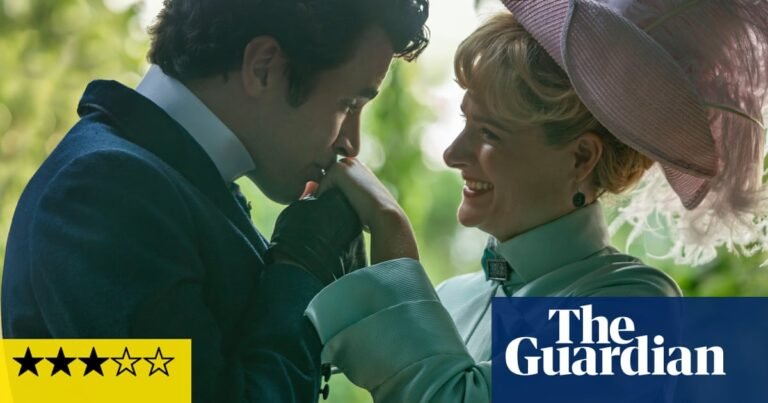The Gilded Age is a curious, unwieldy thing. It is rich in qualities that I love, such as Broadway stars of a certain pedigree and truly extravagant hats. But, for a series that clearly takes a great effort to make, at what appears to be an enormous expense, it is oddly slight. The events of New York society in the late 19th century glide on by, as women dressed in fine, frilly clothing dip in and out of dramas that are sometimes important, sometimes entirely trivial, but almost always afforded equal weight, regardless of how much they matter. To watch it is to sink into a comfortable fugue, and think mostly about the hats.
The household of the sisters Agnes Van Rhijn (Christine Baranksi) and Ada Forte (Cynthia Nixon) has undergone a significant shift in power. After their nephew Oscar (Blake Ritson) almost ruined the family by losing Agnes’s fortune, the crisis of impending poverty was averted at the last minute by the revelation that Ada’s husband, the Rev Luke Forte, who died not long after they were married, was actually stinking rich thanks to a profitable textiles business, leaving Ada a fortune. Fancy that! The Gilded Age can be so soapy that the suds practically foam on the screen.
The previously timid Ada is now funding the household, while the more domineering Agnes is struggling to adjust to her new position as a dependent. When Ada is drawn towards the temperance movement, her attempts to get the staff and her family to join her crusade against the evils of alcohol get short shrift. This goes on for some time. Nixon and Baranski are great, and I suspect that at least 80% of their scenes are contrived simply so we can watch them thesp, if thesping may be used as a verb. (On the evidence of The Gilded Age, it absolutely must be.) Baranski gets to deliver the Maggie Smith lines, such as responding to claims of an unhappy marriage: “Unhappy? What is this babble?”
Giving it some thespian welly … Ashlie Atkinson as Mamie Fish and Carrie Coon as Bertha Russell in The Gilded Age. Photograph: HBO
The nouveau riche Russell household, preposterously showy even by Gilded Age standards, is undergoing a similar power shift. At the beginning, George Russell (Morgan Spector) is out west, buying mines, making money and plotting to build a railway across the US. This leaves his wife, the imperious Bertha (Carrie Coon, also giving it some thespian welly), in charge in New York, and being in charge is a position she relishes. She spends much of this season pondering how to rule the roost, and meddling in the romantic prospects of her son Larry (Harry Richardson) and daughter Gladys (Taissa Farmiga), who are hot tickets on the New York marriage scene.
In the previous seasons, it could be hard to work out whether the creator, Julian Fellowes, had been too constrained by what he was supposed to be making, or too free to make exactly what he wanted to make. Whole episodes would go on, and on, as the stakes dwindled away like a candle burning down to a stub. At least in Downton Abbey, he let rip the onset of Spanish flu; here, it’s mostly society snubs, as women in big hats say things such as, “I hate to pull rank, but my grandfather signed the Declaration of Independence,” and, “What a ghastly gathering.”
But it’s a lot more fun this time around. Modernity is coming, through the railways and commercially viable small clocks. Money comes and goes. Divorce rears its reputation-destroying head. Marian (Louisa Jacobson) announces she has taken a job at an ordinary high school. “But won’t she need a bodyguard?”, asks aunt Agnes. Peggy (Denée Benton), one of the least tiring characters on the show, has been destined for greatness, but now we finally get to see her on the verge of achieving it.
There is romance everywhere. The debate over whether to marry for wealth, security or love, and whether these ambitions are mutually incompatible, is played out in various relationships, over different social plains. There is even the prospect of international fame, amid some boo-hiss villainy from English society, as the old ways butt heads with blunt American forthrightness.
The Gilded Age has become not just grand, but silly too. Instead of joylessly pompous, this show is now joyfully pompous. I’m in.
The Gilded Age aired on Sky Atlantic, and is now available on Now in the UK, HBO and Max in the US, and Paramount+ in Australia.
